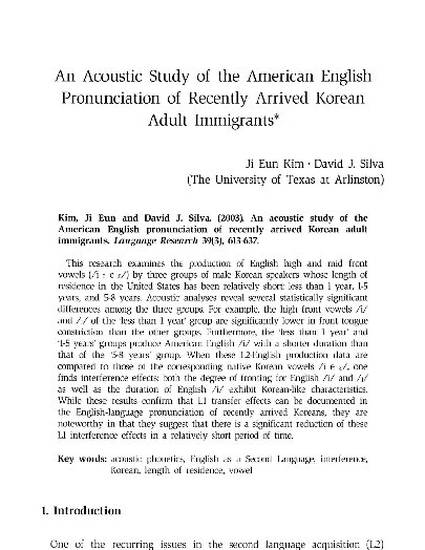
Article
An Acoustic Study of the American English Pronunciation of Recently Arrived Korean Adult Immigrants
Language Research
(2003)
Abstract
This research examines the production of English high and mid front vowels (/iɪ e ɛ/) by three groups of male Korean speakers whose length of residence in the United States has been relatively short: less than 1 year, 1-5 years, and 5-8 years. Acoustic analyses reveal several statistically significant differences among the three groups. For example, the high front vowels /i/ and /ɪI of the 'less than 1 year' group are significantly lower in front tongue constriction than the other groups. Furthermore, the 'less than 1 year' and '1-5 years' groups produce American English /i/ with a shorter duration than that of the '5-8 years' group. When these L2-English production data are compared to those of the corresponding native Korean vowels / i e ɛ/, one finds interference effects: both the degree of fronting for English /i/ and /ɪ/ as well as the duration of English /i/ exhibit Korean-like characteristics. While these results confirm that Ll transfer effects can be documented in the English-language pronunciation of recently arrived Koreans, they are noteworthy in that they suggest that there is a significant reduction of these Ll interference effects in a relatively short period of time.
Disciplines
Publication Date
September 1, 2003
DOI
http://hdl.handle.net/10371/86246
Citation Information
Ji Eun Kim and David J. Silva. "An Acoustic Study of the American English Pronunciation of Recently Arrived Korean Adult Immigrants" Language Research Vol. 39 Iss. 3 (2003) p. 613 - 637 Available at: http://works.bepress.com/david-silva/4/
